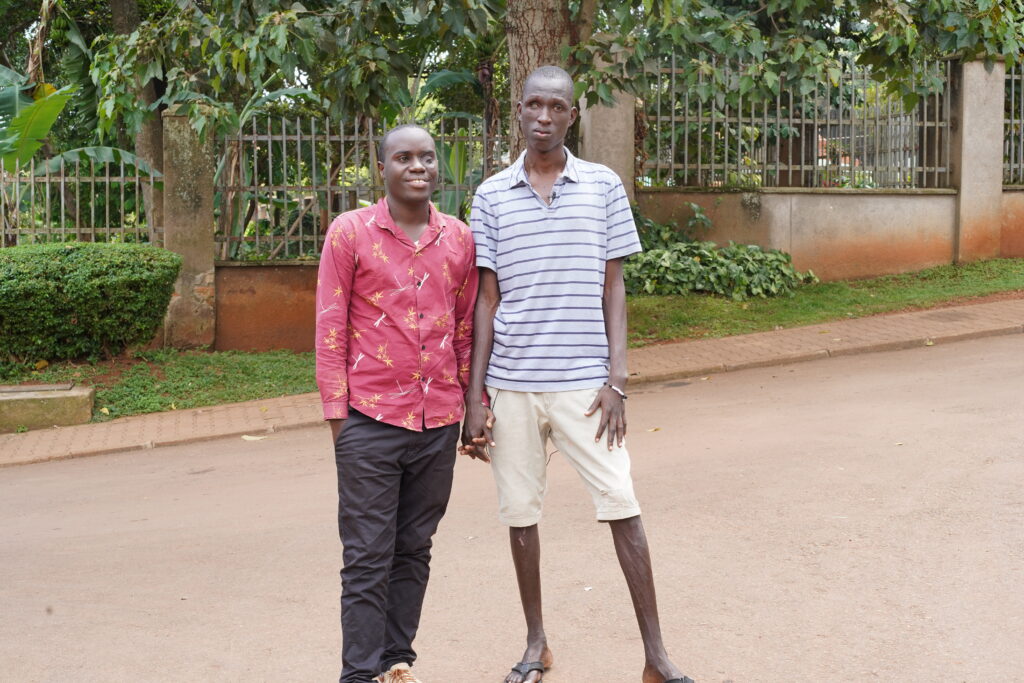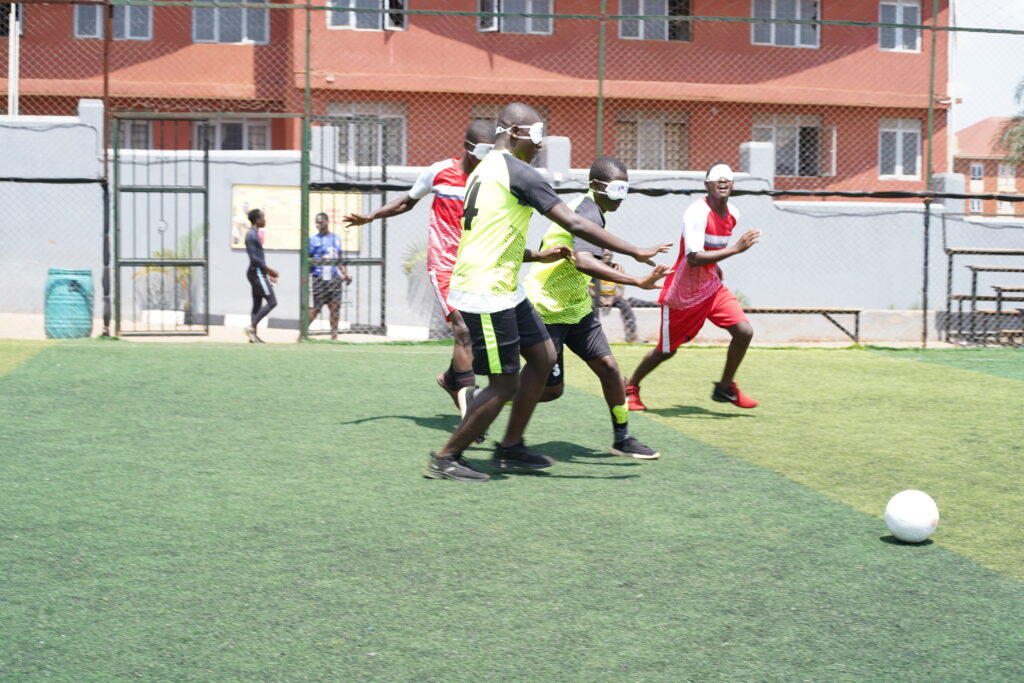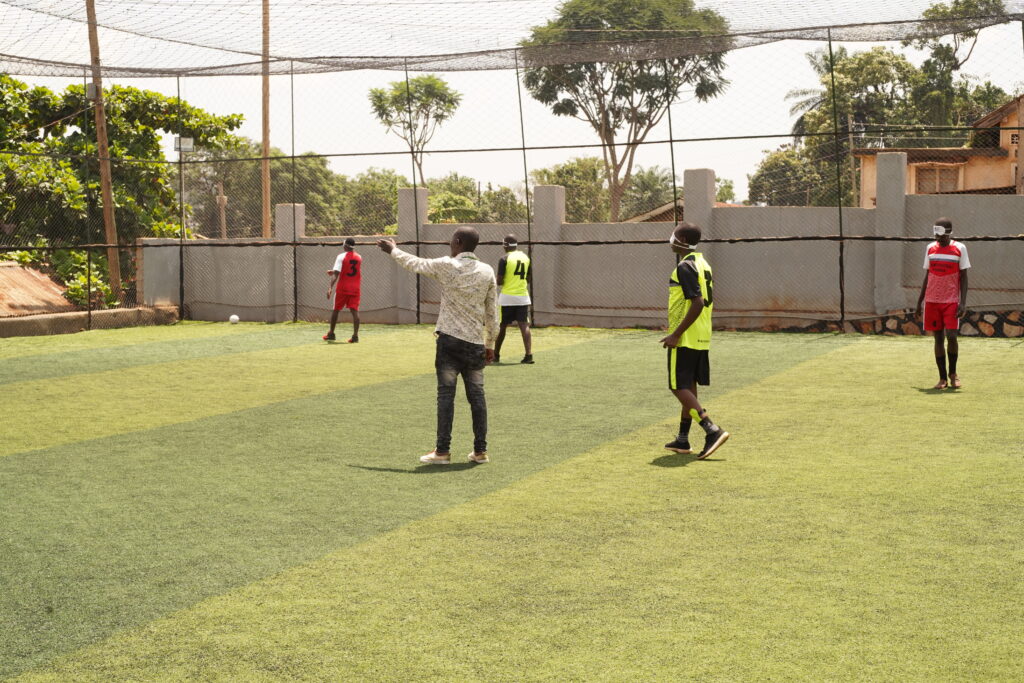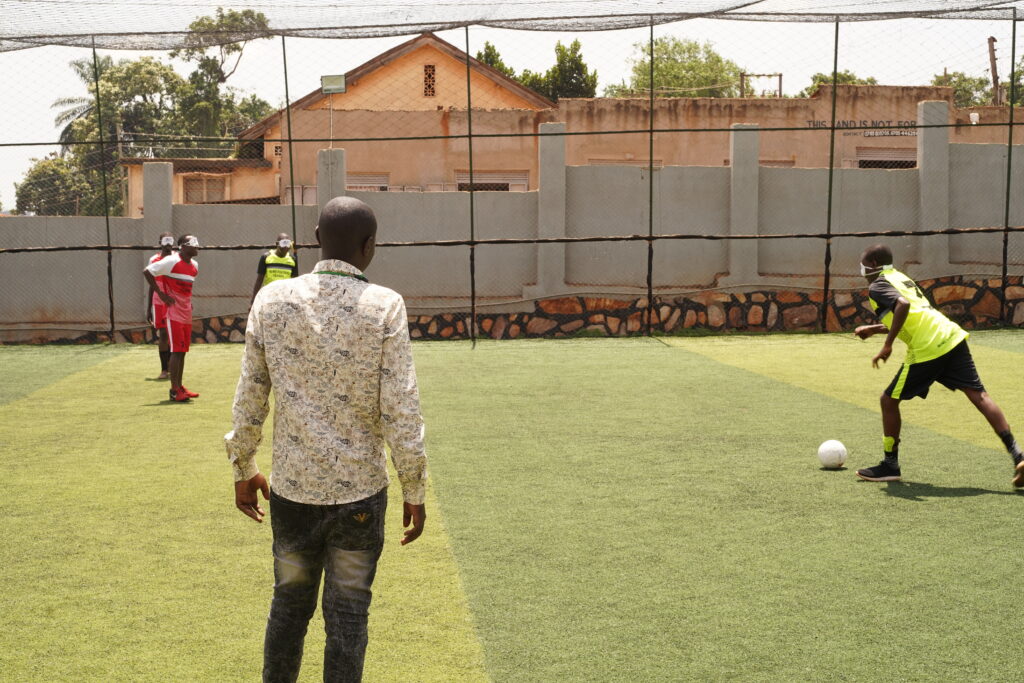At 15 years old Alex Nyekorach lost his sight. At the time, he was so obsessed with playing football and hoped he would one day play for his school team at Iganga Secondary School, in Iganga district, let alone the Uganda Cranes, the national football team.
For two years, he had been in and out of the hospital, in a bid to redeem himself from a meningitis condition until one day when his eyes succumbed to darkness’s affliction.
“I didn’t suddenly wake up and find myself unable to see. Instead, every day the darkness in my eyes grew until everything before me appeared to be blurry then I eventually lost all sight “,” Nyekorach reminisces.
On return to his hometown in Gulu, Northern Uganda, Nyekorach couldn’t freely mingle with his peers again because they thought ‘it was contagious’.
“Even some of my family members didn’t want to get anywhere close to me. They thought I had been bewitched and I would bring a bad omen to the whole clan,” he recounts.

Alex Nyekorach (Right) poses for a photo moment with his friend and coach Muzafaru Jagwe ahead of football practice at Makerere University. Photo by Richard Mugambe.
While discrimination on the basis of disability is outlawed in Uganda, there are still criticisms and the lack of access to justice makes it worse.
In a 2017 research conducted at Makerere University where Nyekorach is currently pursuing a Bachelor’s Degree in Social Sciences, up to 24% of visually impaired respondents reported feelings of isolation and lack of socialization. This is a recipe for stress and mental wellness.
The hard of seeing often find themselves confronting a multitude of challenges, often without any meaningful social support from university authorities. This lack of assistance can leave them feeling isolated and unsupported hence compounding the difficulties they face.
“They are never given the opportunity to explore the world around them on their own. Their parents and caretakers often believe that they cannot be safe without constant supervision, which can severely restrict their ability to develop social skills and interact with others,” says Anthony Mugagga Muwagga, a disability inclusion advocate.
Mugagga argues that as a result, the visually impaired may come across as less confident and are less willing to initiate social interactions. This isolation can leave them feeling disconnected from the world and in need of alternative social experiences that cater to their unique needs.

Blind football players during an evening drill at a private lawn outside Makerere University. Photo by Richard Mugambe.
Kicking isolation away
Inclusion advocate Jagwe Muzafaru’s story is one that defies the odds and inspires admiration. He narrowly escaped a fate that could have left him completely blind.
When he was just seven years old, he was struck with a devastating infection that ravaged his right eye, leaving him with only one functioning eye.
Jagwe’s setback could have derailed his childhood aspirations, but instead, it fueled his determination to compete on equal footing with his fully-sighted colleagues. Moreover, he also found a way to support his visually impaired peers.
In the waning months of 2021, Jagwe stumbled upon a series of YouTube videos featuring visually impaired individuals playing football. The footage ignited a spark within him and he knew he had to share this newfound passion with his colleagues. Without hesitation, he rallied his peers and embarked on a journey that would later define the well-being of more than 50 visually impaired students.
“Most of them rarely move beyond the confines of their hostel rooms and homes when they are off school. So, my aim, in the beginning, was not to make it competitive, but to create a space that would give them a life beyond the normal,” remarked Jagwe.

Blind football coach Muzafaru Jagwe gives directions during an evening session outside Makerere University. Photo by Richard Mugambe.
The Thrilling World of Blind Football
In the silent playground, a game unlike any other unfolds. The players, all visually impaired, rely on the symphony of sounds around them to maneuver the pitch with unparalleled skill. The attentive crowd, directed by stewards, understands the importance of silence during the match to allow the players to hear every critical detail.
“We first inspect the pitch to understand its geography. This will help us to know where the goals are, and how big the pitch is,” explains Ronald Kamusiime, one of the football players.
In an inspiring display of sportsmanship, players adorn blindfolds before the game begins, leveling the playing field for all. While some may possess varying levels of sight, the blindfolds create a fair and equal environment for every player, removing any advantages or disadvantages.
Behind the goalposts stand vigilant instructors, their eyes fixed on the players as they make their way toward the goal territory. With every step the player takes, the instructors shout out critical instructions, guiding the players.
The goalkeepers, sighted and focused, stand ready to defend their territory. As the players approach the goalposts, the instructors’ voices grow louder and more urgent, calling out “Shoot, shoot!”.
With unbridled determination, the player winds up for a powerful shot, aiming to strike the ball with all their might. While the ball may not hit the target, the unwavering grin on the player’s face remains unfazed by any missed shots. For this athlete, it’s not about whether the ball sails past the opponent or falls short, but rather about the sheer joy of the game itself.
“Football helps us to develop important life skills, such as teamwork, communication, and leadership, which serve us well beyond our university years. It is not just a game for us, it is a lifestyle,” Nyekorach remarks.

A player takes a shot during a training exercise overseen the head coach. Photo by Richard Mugambe.
Beyond the physical to the mental
As the sound of the rattling ball fades down, it’s the conversations that follow that are truly priceless. After every training session, teammates open up about their personal struggles and triumphs, creating a bond that goes beyond the game. Between tackling life’s challenges and sharing lighthearted moments, these conversations are the glue that keeps the group together both on and off the field.
Recent News
© 2022 - Media Challenge Initiative | All Rights Reserved .


